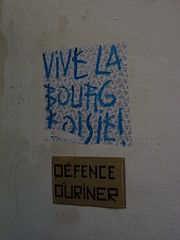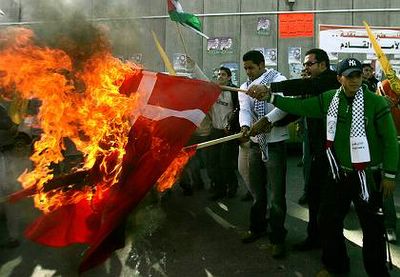Totally predictable list of music I didn't hate this year:
Architecture in Helsinki,
In Case We Die. Along with
Deerhoof, I think AiH is a great example of the resurgence of pop music. Challenging but catchy as all hell, both of them. Just goes to show that
69 Love Songs is the most important record of the decade, the way
Nevermind and
Loveless were for the 90's.
Bloc Party,
Silent Alarm. Backlash-proof. Yeah it's another Gang of Four ripoff, but it sounds good, y'know?
Clap Your Hands Say Yeah. Yeah.
Edan,
Beauty and the Beat. Yes I'm white. Why do you ask?
Feist "Mushaboom,"
Coralie Clement "Bye Bye Beauté,"
Keren Ann "Chelsea Burns." I'm not sure it's fair to lump these three together. I like them in very small doses, but these are all great songs convincingly performed. Fragile and soft is the new riot grrl.
Four Tet "Joy." Less beautiful than "My Angel Rocks Me Back and Forth. "
The Kills,
No Wow. I didn't listen to this enough, but I have no doubt that it'll hold up, so I can still listen to it next year. Shows the Yeah Yeah Yeahs how it's done.
Metric, "Monster Hospital" and
Ladytron, "Destroy Everything You Touch." The best political songs are the ones that don't get noticed as political songs. "When the President Talks to God" sucks.
M.I.A. is still awesome, though. "Rich Man's War," by
Steve Earle too.
Of Montreal, "The Party's Crashing Us Now." I have more songs and fewer albums on this list than I would have had last year, because have an iPod now. Put them in with AiH and Deerhoof as quirky pop.
New Pornographers "Bleeding Heart Show." I don't think the album's great, but this song is. Less pop than the first two albums. It seems like they're starting to take themselves seriously, which normally I'd say that's a bad thing, but here it works.
Nouvelle Vague, s/t. This is how songs get canonized. Right on the border between a novelty record and a standards album.
Stars,
Set Yourself On Fire. "I am trying to say what I wanted to say without having to say I love you." What kind of self-respecing neurotic can't identify with that?
Sleater-Kinney,
The Woods. Are they turning into hippies? I still like
Call the Doctor and
Dig Me Out more, but this is good. I'm imagining stoned teenagers in the seventies listening to Zeppelin and Deep Purple and saying "man, this just ROCKS," and now I know exactly what they meant. In those "music genome" projects that people are working on right now, do you suppose there's a category for how much something "rocks"? This one would be at 11, obviously.




